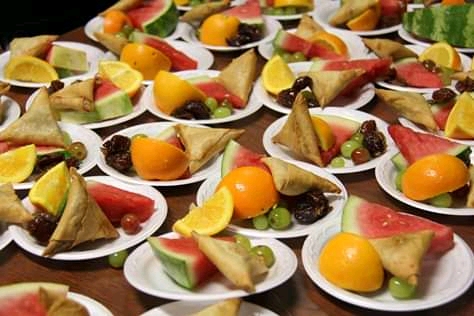During the Holy month of Ramadhan, healthy adult Muslims practise daily fasting from dawn until sunset.
Traditionally, one breaks the fast at sunset with a meal called iftar and then eats again with a pre-dawn meal called suhoor. There is evidence to suggest that fasting can have positive effects on your health.
Social life during the month of Ramadhan is particularly active: people have guests or are hosted by relatives and friends. Visits are primarily centred on the meal that breaks the fast, which is a rich and festive meal, served with all the best foods.
People fast during the day, and are awake and eat during the evening hours. During Ramadan, some people may not undertake physical activity, and consequently, may gain weight during the month. People with diabetes may not control their condition well due to the adoption of unhealthy eating habits.
By following simple guidelines, you may be able to lose weight and decrease your blood pressure and cholesterol. Alternatively, over-indulging in iftar or suhoor meals can cause weight gain.
Ramadhan is often seen as a time to practise self-control, self-discipline, sacrifice and empathy for those less fortunate. It is encouraged to try to maintain these practices even outside of fasting hours.
Recommended nutritional and health rules:
Drink plenty of water and eat hydrating foods during Ramadan: drink plenty of water between iftar and suhoor meals. High temperatures can also make you perspire more, so it is important to drink fluids to replace what you lose during the day (at least 10 glasses).
You can also increase water intake by eating hydrating foods. Try adding watermelon to your suhoor meal or eat it as a sweet treat after iftar.
Green salad contains plenty of hydrating cucumber and tomato. Avoid caffeinated drinks such as coffee, tea and cola, because caffeine can make some people urinate more often, which may lead to dehydration. Also remember that fizzy drinks with sugar will add calories to your diet. Foods rich in water may be served, such as soup or fresh vegetable salad.
Replenish your energy levels by eating a healthy, balanced iftar
Eating three dates to break your fast is a traditional and healthy way to begin iftar. Dates are an excellent source of fibre. Incorporate plenty of vegetables to provide vital vitamins and nutrients. Choose whole grains, which provide the body with energy and fibre.
Enjoy grilled or baked lean meat, skinless chicken and fish, to get a good portion of healthy protein. In general, avoid fried and processed foods high in fat or sugar. Enjoy your meal and avoid overeating by eating slowly.
It is recommended to eat suhoor
Suhoor is the light meal before the beginning of the fast every day; this applies especially to special groups such as older people, adolescents, pregnant women and nursing mothers, as well as children who choose to fast. This meal, which constitutes a light breakfast, needs to include vegetables, a serving of carbohydrates such as bread/bread roll made from wholewheat, protein-rich food such as dairy products (cheese that is not salty/labane/milk) and/or egg, as well as a tehina/avocado side dish.
Avoid too many sweets after your iftar meal. Sweets commonly eaten during Ramadan contain large amounts of sugar syrup. The recommended sweet for consumption is cold water-containing fruit, such as watermelon/melon or any other seasonal fruit, such as peach or nectarine.
One should try to curtail the consumption of foods rich in fat, especially fatty meats, foods made with puff pastry, or pastry with added fat/margarine or butter. Rather than frying, it is recommended to use other methods of cooking, such as steaming, cooking in sauce, stir-frying in a small amount of oil and baking.
Avoid foods containing large amounts of salt, e.g. sausages, processed and salted meat and fish products, olives and pickles, snack foods, salty cheeses, various types of ready-made crackers, salads, spreads and sauces (such as mayonnaise, mustard, ketchup). When preparing the meal, it is recommended to curtail the use of salt as far as possible, and of course it is recommended to remove the salt shaker from the table.
Use various herbs to enhance the flavour of foods being cooked.
Eat slowly, and in amounts appropriate to the needs of each individual. Big meals cause heartburn and discomfort.
Try to move as much as possible and to be active in the evenings, for example, by going for a regular daily walk.
Fasting with diabetes and hypertension
People with type 1 diabetes are generally advised not to fast. People with type 2 diabetes and hypertension who have their conditions under control, either through diet or medication, may be able to fast. However, they are advised to refer to their doctor or dietitian for the right advice based on their situation.
Fasting during pregnancy and breastfeeding:
Pregnant women and nursing mothers should refer to their doctor for advice.
Example of an iftar meal:
Home-made vegetable soup (not from soup-powder)
Green salad, or other vegetable salad of choice
Stuffed vegetables (squash/eggplant/grape leaves)
Baked chicken breast
Drink plenty of water; lemon slices and mint leaves can be added to enhance the taste.
Example of a suhoor meal :
2 slices of bread
Vegetable omelette or hard-boiled egg.
Sliced vegetables from two vegetables.
Labane or cheese with added za’atar and olive oil.
Herbal tea.
Don’t forget to drink an adequate amount of water.
Source: World Health Organisation: Regional Office for Eastern Mediterrenian.




















